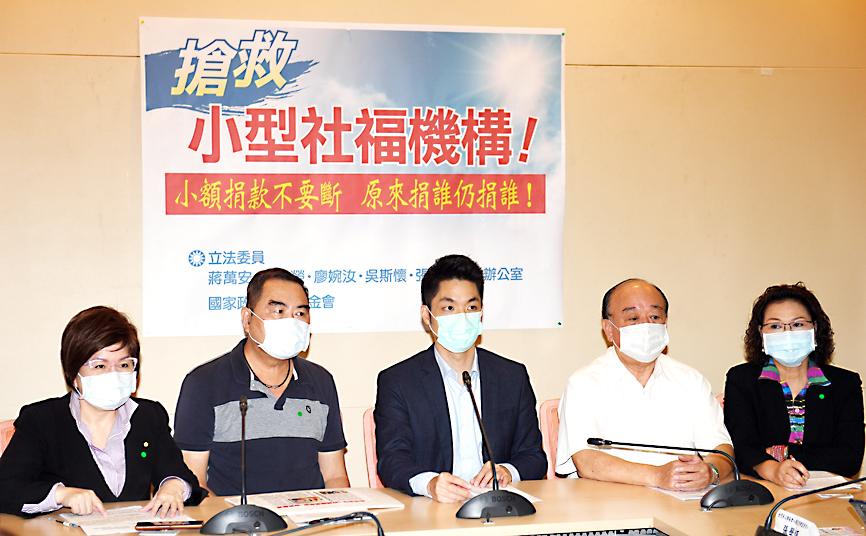Chinese Nationalist Party (KMT) legislators yesterday encouraged the public not to stop donating to charities, as even small sums could save groups facing difficulty raising funds amid the COVID-19 pandemic.
“It is not an issue of being charitable,” KMT Legislator Wu Sz-huai (吳斯懷) said. “Whether these organizations survive can spell life or death for the disadvantaged people they care for.”
The pandemic is also affecting fundraising for social welfare and eating into funds for standing outreach, said Chang Hsueh-heng (張學恆), founder of a watchdog for the rights of those with mental and physical disabilities.

Photo: CNA
The government should give a six-month subsidy, help people willing to work for certain organizations and give subsidies to volunteers, Chang said.
Council of Social Welfare, Taiwan secretary-general Chen Fen-ling (陳芬苓) said that her group has helped more than 3,000 social welfare groups in Taiwan, many of whom play an important role in helping the disadvantaged.
“If these groups fail to weather the pandemic, the government will find itself shouldering a much heavier social welfare burden,” Chen said.
Social welfare organizations not receiving government subsidies can get overlooked, Taiwan Hsin Chu Lun Association secretary-general Chen Yu-hsin (陳裕昕) said, adding that most of them do not meet the criteria for subsidies.
The groups are seeing a 30 to 40 percent decline in donations and sales income, which is starting to hurt them, Chen Yu-hsin said.
KMT Legislator Chiang Wan-an (蔣萬安) urged the government to look into the issue and offer help.
The government has overlooked social welfare groups — which should be considered disadvantaged groups — and is too focused on bailing out other businesses, KMT Legislator Chang Yu-mei (張育美) said.
Separately, the KMT held a conference at its headquarters in Taipei to urge the government to offer greater help to workers.
KMT Culture and Communications Committee chair Alicia Wang (王育敏) said that government subsidies are restrictive, with only certain sectors of workers benefitting, while the majority of workers go without subsidies.
The Ministry of Labor is offering loans for employee salaries to businesses affected by the pandemic, it said in a press release yesterday, adding that severely affected businesses could receive 40 percent of employees’ monthly salaries, up to NT$20,000.
These measures are meant to help businesses get back to work after the pandemic passes, without having to hire any new employees, it said.
There are subsidies for salaries, vocational training costs, job losses and labor insurance, as well as temporary suspensions of payments and interest on start-up loans for businesses, the ministry added.
Workers in need can obtain up to NT$100,000 in loans, it said, adding that the Ministry of Health and Welfare is also offering subsidies for those in financial difficulty.
Subsidy thresholds must be established to provide limited funding to those who truly needed it, the Ministry of Labor said, adding that the government is providing all the help it can to industries affected by the pandemic.

Taiwan has received more than US$70 million in royalties as of the end of last year from developing the F-16V jet as countries worldwide purchase or upgrade to this popular model, government and military officials said on Saturday. Taiwan funded the development of the F-16V jet and ended up the sole investor as other countries withdrew from the program. Now the F-16V is increasingly popular and countries must pay Taiwan a percentage in royalties when they purchase new F-16V aircraft or upgrade older F-16 models. The next five years are expected to be the peak for these royalties, with Taiwan potentially earning

POSITIVE DEVELOPMENT: Japan and the US are expected to hold in-depth discussions on Taiwan-related issues during the meeting next month, Japanese sources said The holding of a Japan-US leaders’ meeting ahead of US President Donald Trump’s visit to China is positive news for Taiwan, former Japan-Taiwan Exchange Association representative Hiroyasu Izumi said yesterday. After the Liberal Democratic Party’s landslide victory in Japan’s House of Representatives election, Japanese Prime Minister Sanae Takaichi is scheduled to visit the US next month, where she is to meet with Trump ahead of the US president’s planned visit to China from March 31 to April 2 for a meeting with Chinese President Xi Jinping (習近平). Japan and the US are expected to hold in-depth discussions on Taiwan-related issues during the

‘LIKE-MINDED PARTNER’: Tako van Popta said it would be inappropriate to delay signing the deal with Taiwan because of China, adding he would promote the issue Canadian senators have stressed Taiwan’s importance for international trade and expressed enthusiasm for ensuring the Taiwan-Canada trade cooperation framework agreement is implemented this year. Representative to Canada Harry Tseng (曾厚仁) in an interview with the Central News Agency (CNA) said he was increasingly uneasy about Ottawa’s delays in signing the agreement, especially as Ottawa has warmed toward Beijing. There are “no negotiations left. Not only [is it] initialed, we have three versions of the text ready: English, French and Mandarin,” Tseng said. “That tells you how close we are to the final signature.” Tseng said that he hoped Canadian Prime Minister Mark Carney

STAY IN YOUR LANE: As the US and Israel attack Iran, the ministry has warned China not to overstep by including Taiwanese citizens in its evacuation orders The Ministry of Foreign Affairs (MOFA) yesterday rebuked a statement by China’s embassy in Israel that it would evacuate Taiwanese holders of Chinese travel documents from Israel amid the latter’s escalating conflict with Iran. Tensions have risen across the Middle East in the wake of US and Israeli airstrikes on Iran beginning Saturday. China subsequently issued an evacuation notice for its citizens. In a news release, the Chinese embassy in Israel said holders of “Taiwan compatriot permits (台胞證)” issued to Taiwanese nationals by Chinese authorities for travel to China — could register for evacuation to Egypt. In Taipei, the ministry yesterday said Taiwan